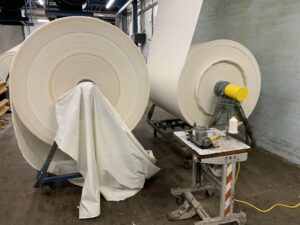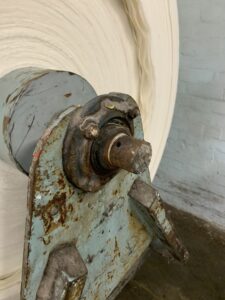A textiles company has been fined £60,000 after a man broke his arm when it was dragged into machinery at a site near Chorley.
The employee, a man from Blackrod in Greater Manchester, suffered serious injuries to his right arm in the incident at the factory operated by Pin Croft Dyeing and Printing Co. Limited in Market Street, Adlington, on 20 June 2022.
An investigation by the Health and Safety Executive (HSE) found the man had been operating a large fabric spooling machine when a brake malfunctioned. During his attempt to manually slow the rotation of the machine, his sleeve became caught up with an exposed grooved spindle and his right arm was drawn into the mechanism. It became twisted by the rotation of the machine which broke both major bones in the forearm and caused serious tissue damage.

HSE guidance is available how important it is for employers to consider how their workers use machinery and to have adequate arrangements in place to ensure it remains safe to use.
Despite the company being aware of the risk posed by the moving spindle, they failed to either remove or suitably guard this part of the machinery.
As a result of his injuries, the man, who was right-handed, spent four nights in hospital and was unable to return to work for six months.
Preston Magistrates Court heard that Pin Croft Dyeing and Printing Co. Limited of Adlington Works, Market Street, Adlington, Lancashire had neither guarded nor removed the exposed grooved spindle despite being aware of the risk it posed to employees.

The company pleaded guilty to breaching section 2(1) of the Health and Safety at Work Act 1974. They were fined £60,000 and was ordered to pay £2.147 costs at a hearing at Preston Magistrates Court on 31 January 2024.
After the hearing, HSE inspector David Bellis said: “This man’s injuries were serious but they could have been much worse. The whole incident and its consequences could have been avoided if basic safeguards had been put in place.
“At HSE we would like highlight that all employers should make sure they properly assess and apply effective control measures to minimise the risk from dangerous parts of machinery.”
The prosecution was brought by HSE enforcement lawyer Chloe Ward.
Notes to Editors:
- The Health and Safety Executive (HSE) is Britain’s national regulator for workplace health and safety. We prevent work-related death, injury and ill health through regulatory actions that range from influencing behaviours across whole industry sectors through to targeted interventions on individual businesses. These activities are supported by globally recognised scientific expertise.
- More information about the legislation referred to in this case is available.
- Further details on the latest HSE news releases is available.